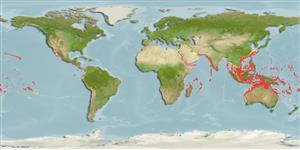Environment: milieu / climate zone / depth range / distribution range
Écologie
marin récifal; profondeur 3 - 150 m (Ref. 9281). Tropical; 30°N - 35°S, 29°E - 70°W
Indo-Pacific: in tropical waters, from South Africa to Hawaii and Easter Island, north to southern Japan and south to Lord Howe Island. Eastern Pacific: Revillagigedo, Clipperton and Cocos islands (Ref. 9281).
Taille / Poids / Âge
Maturity: Lm ? range ? - ? cm
Max length : 51.0 cm NG mâle / non sexé; (Ref. 89467); poids max. publié: 1.8 kg (Ref. 89467)
Épines dorsales (Total): 0; Rayons mous dorsaux (Total): 96-104; Épines anales 0; Rayons mous anaux: 74 - 81. Eyed side with dark margined light colored spots and numerous scattered small dark spots; normally with 3 dark blotches or spots on lateral line; dorsal and anal fins with longitudinal row of widely-spaced dark spots; pectorals of the eyed side with dark crossbars (Ref. 4417).
Inhabit sandy bottoms of coastal coral reefs (Ref. 5213, 48637), generally in shallow water (Ref. 9281). Benthic (Ref. 58302). Hunt mostly at night, but also active during the day. Often crawling over low rocky reef (Ref. 48637). Occasionally rest on bare rock (Ref. 1602). Feed on fishes, crabs and shrimps. Collected by divers (Ref. 9824).
Life cycle and mating behavior
Maturité | Reproduction | Frai | Œufs | Fécondité | Larves
Hensley, D.A., 1986. Bothidae. p. 854-863. In M.M. Smith and P.C. Heemstra (eds.) Smiths' sea fishes. Springer-Verlag, Berlin. (Ref. 4417)
Statut dans la liste rouge de l'IUCN (Ref. 130435)
Menace pour l'homme
Harmless
Utilisations par l'homme
Pêcheries: commercial; Aquarium: Commercial
Plus d'informations
Noms communsSynonymesMétabolismePrédateursÉcotoxicologieReproductionMaturitéFraiRassemblement de ponteFéconditéŒufsDéveloppement de l'œuf
RéférencesAquacultureProfil d'aquacultureSouchesGénétiqueElectrophoresesHéritabilitéPathologiesTraitementNutrientsMass conversion
Outils
Articles particuliers
Télécharger en XML
Sources Internet
Estimates based on models
Preferred temperature (Ref.
123201): 23.8 - 29, mean 27.7 °C (based on 1590 cells).
Phylogenetic diversity index (Ref.
82804): PD
50 = 0.5000 [Uniqueness, from 0.5 = low to 2.0 = high].
Bayesian length-weight: a=0.01000 (0.00426 - 0.02347), b=3.07 (2.89 - 3.25), in cm total length, based on LWR estimates for this Genus-body shape (Ref.
93245).
Niveau trophique (Ref.
69278): 4.4 ±0.0 se; based on diet studies.
Résilience (Ref.
120179): Milieu, temps minimum de doublement de population : 1,4 à 4,4 années (Preliminary K or Fecundity.).
Fishing Vulnerability (Ref.
59153): Low vulnerability (18 of 100).
Nutrients (Ref.
124155): Calcium = 37.4 [14.6, 68.9] mg/100g; Iron = 0.5 [0.2, 0.9] mg/100g; Protein = 18.4 [16.9, 20.0] %; Omega3 = 0.0885 [, ] g/100g; Selenium = 41.6 [20.7, 91.1] μg/100g; VitaminA = 83.6 [21.4, 339.0] μg/100g; Zinc = 0.681 [0.436, 1.016] mg/100g (wet weight);
